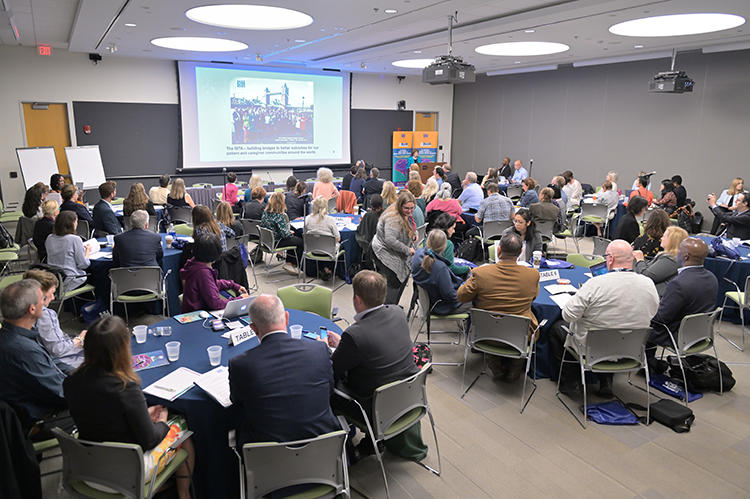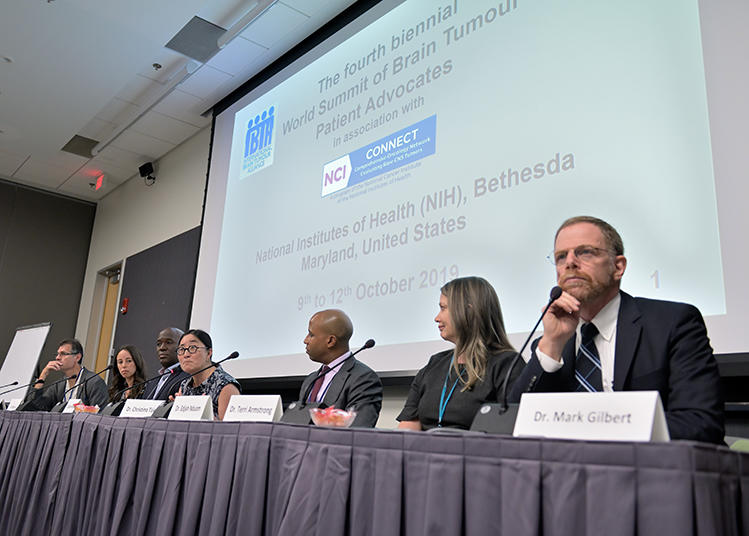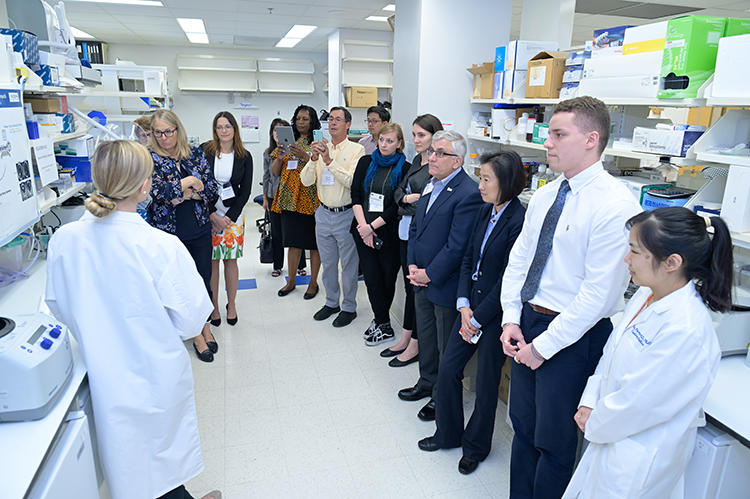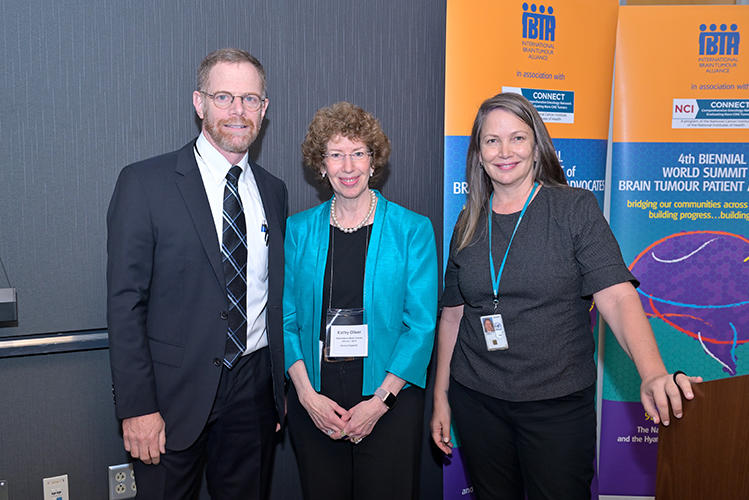Fourth Annual World Summit of Brain Tumour Patient Advocates
, by Kristin Odom, NCI-CONNECT Communications Editor
Patient advocates from around the world gathered to share and discuss ways to improve outcomes for people with brain tumors through collaborations, knowledge, and hope.
The International Brain Tumour Alliance (IBTA) and NCI-CONNECT co-hosted the Fourth Biennial World Summit of Brain Tumour Patient Advocates at NIH in Bethesda, Maryland on October 9-12, 2019. The IBTA is an NCI-CONNECT advocacy partner, which means the organization shares a common concern for improving the outcomes of adult patients with rare central nervous system (CNS) tumors through awareness and education.
Attendees at the summit included 97 patient advocates, researchers, health care professionals, regulators, pharmaceutical industry representatives, and others from 25 countries and five continents.
The three-day summit included presentations, working groups, and panel discussions focused on understanding current treatments and care, the important role of patient advocates in the brain tumor community, and what matters most to brain tumor patients and caregivers. Kathy Oliver, chair and co-director of the IBTA, kicked off the summit by unifying participants to a common goal: to significantly improve outcomes for brain tumor patients through greater collaboration, greater knowledge, and greater hope.
Day 1: Treatment and Patient Care Updates
On the first day of the summit, Mark Gilbert, M.D., chair of the NCI Center for Cancer Research's Neuro-Oncology Branch (NOB) and co-leader of NCI-CONNECT, presented an overview of the NOB's brain tumor treatment and research. Dr. Gilbert spoke about the unique challenges people with brain tumors face, current treatments and clinical trials, and benefits and risks.
“Brain tumors affect the core of who people are, and it is often a diagnosis that people live with for the rest of their life. So, there is a distinct impact on the patient and family,” shared Dr. Gilbert. “It is also a difficult disease to treat.” The NOB aims to address these challenges and improve the treatment and outcomes for patients with brain tumors.
Then, neuro-oncology providers presented updates on brain and spine tumor treatments and care, including surgery, radiation therapy, systemic treatments, neuropathology, and rehabilitation. These educational presentations outlined how people with brain tumors suffer greater distress and have greater needs than people with other cancer types, the role of each therapy, and hopeful advances. In particular, NCI Neuropathologist Kenneth Aldape, M.D., shared the significance of using molecular criteria to provide a more accurate classification system for diagnosing brain tumors. Following the presentations, the experts answered questions from the audience.
Terri Armstrong, Ph.D., deputy chief of the NOB and co-leader of NCI-CONNECT, led a session focused on quality of life. She presented on the impact of a brain tumor on the person, sharing the unique challenges people face, including pain, difficulty communicating, cognitive impairments, and seizures. In another presentation, patient-reported outcome surveys showed that people with brain tumors want treatments to alleviate such symptoms and improve their quality of life. Researchers and providers are using survey data to enhance their understanding of the impact of CNS cancers and treatments and make improvements.
At the end of the day, attendees toured the neuro-oncology research labs at NIH—the translational immunology lab, the molecular and cell biology lab, the translational research lab, the cancer metabolism lab, and the outcomes lab—to see bench-to-bedside research in action.
Day 2: Knowledge and Collaborative Opportunities
The second day of the summit included more educational presentations, sessions on multidisciplinary professional global organizations, working groups for focused discussions on specific patient care topics, and presentations from patient advocacy groups from around the world.
Attendees learned about genetic testing and counseling as part of the NCI-CONNECT Clinic with Margarita Raygada, Ph.D., oncology genetic counselor and geneticist at NCI. Evaluating family and medical history can determine the risk of developing brain tumors.
A presentation on the Society for Neuro-Oncology (SNO)—a multidisciplinary organization dedicated to promoting advances in neuro-oncology through research and education—helped attendees learn about professional resources for advancing the field, which are also available in less developed regions of the world.
Eight breakaway sessions were held concurrently, giving attendees the opportunity to take a deep dive into more specific topics in smaller groups. Topics were presented by experts and included returning to school; fundraising for brain tumor research; tips on managing a support group; care mapping; designing clinical trials with NCI neuro-oncologist Jing Wu, M.D., Ph.D., and NCI clinical collaborator Lieutenant Colonel Brett Theeler, M.D.; brain tumor registries; symptom burden and management; and survivorship care planning with NCI Neuro-Oncologist Heather Leeper, M.D.
Then, patient advocacy groups from Australia, Italy, Poland, the United States, and the United Kingdom each shared their personal stories and their impact on the brain tumor community. Most of the groups aim to provide education and resources, as well as advance research. Some provide emotional support and are specific to a tumor type, and some are the only resource in their country for people with a brain or spine tumor. The stories shared were heart-wrenching and heartwarming and showed their successful efforts to help the community.
Day 3: Exchanging Ideas to Move Forward
The final day captured a lot of discussion with various stakeholders on important topics to move the field forward, including public policy for brain tumor advocates and the vision to conquer—and not just cure—brain tumors.
Another multi-stakeholder initiative called All.Can works to improve the efficiency of cancer care by focusing on what matters most to patients. It carried out an international survey to ask patients and caregivers directly about their experience with cancer and where there were inefficiencies with their care.
The final sessions of the summit were expert panel and audience discussions. Panel members were selected to represent a variety of perspectives on various topics, with the hope of exchanging ideas and increasing understanding and opportunities for collaboration. NCI clinical providers Dr. Gilbert, Dr. Armstrong, Marta Penas-Prado, M.D., and Kathleen Wall participated. Topics included: influencing the brain tumor research agenda, aligning perspectives on clinical benefit, improving accrual to brain tumor clinical trials, and access to therapies.
Attendees learned a lot at the summit and had a unique opportunity to engage with leading specialists in brain tumor treatment and research. The summit concluded with a clear message that the brain tumor community can—and needs—to do better to give hope and continue to collaborate to improve treatments and outcomes for people with brain tumors.
Reporting for this summary was adapted from the full IBTA report written by Chris Tse, IBTA senior advisor, and report editor Kathy Oliver, IBTA chair and co-director.



